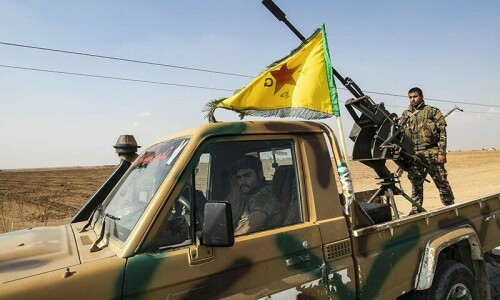NEW YORK, Nov 16: As the US casualties mount in Iraq, the American public opinion on war is shifting rapidly with calls for immediate withdrawal, an option that would be disastrous to President Bush’s reelection campaign.
Appearing on news on Sunday morning shows, US civil administrator, for Iraq Paul Bremer, observed that a new Iraqi government, once it assumes power, would keep US troops in the country “for some time to come.”
Mr Bremer appeared on the US programmes from Baghdad, where it was announced on Saturday that a sovereign Iraqi government would take over power from occupation authorities by the end of June 2004. Mr Bremer had been recalled to Washington last week for consultations.
Mr Bremer said the US-appointed Iraqi Governing Council had agreed to negotiate a security arrangement under which US troops would remain in the country even after full sovereignty is restored.
Asked if Iraqis could expel US forces once authority is turned over to them, Bremer said: “No ... there will be a side agreement dealing with our mutual security interests, which we will also negotiate between now and the end of June.”
“I’m sure the Iraqi government is going to want to continue to have coalition forces here for its own security for some time to come,” he said on ABC’s “This Week” programme.
“Once they have independence and sovereignty, of course, they can make up their own mind as to what they want to do. I don’t think that you’ll find that that is going to happen.”
The New York Times in a lead editorial noted “Iraqis are growing weary of American occupation and the White House argues that they will not tolerate the current situation long enough for a constitution to be prepared. That is the precise reason that the job should be turned over to the UN. The UN has far more international experience, credibility and reputation for neutrality in these matters than the US does. There is certainly no guarantee it can succeed. There is only the certainty that the Bush administration, which has made all the wrong bets so far, does not have any better options.”
Meanwhile, those European leaders who opposed the US invasion of Iraq now feel vindicated but are also deeply troubled by the prospect of an American failure, the Washington Post reported on Sunday, our Washington correspondent adds.
In a 2,300-word survey, conducted by its correspondents in various European capitals, the Post says many in Europe fear that a US humiliation in Iraq could propel the United States back into a post-Vietnam War shell of quasi-isolationism.
Political leaders and analysts in Berlin, Brussels, London and Paris told the Post that a decrease in US interests in world affairs may “embolden terrorists and dictators.”
“There is widespread agreement about what went wrong — that the United States, backed by a handful of allies such as Britain, rushed into war without international consensus and without proper planning about how to govern and rebuild the country once the opening round of conflict ended,” the report said.
Europeans, however, are much less certain about where to go from here, the report says. “Virtually all endorse turning over political power to Iraqis as soon as possible. Many would like to see the United Nations take a more active role.”
“But no one knows how to deal with the immediate security crisis. Most European leaders find themselves on the sidelines, unwilling to earmark funds or troops to a foundering cause they did not sign up for in the first place.”
“This is a war which should not have taken place,” said Francois Heisbourg, director of the Foundation for Strategic Research in Paris and an adviser to the French Foreign Ministry. “They say, ‘you break it, you keep it.’ Well, the Americans really have broken it, and I don’t see how we can put it back together.”















































Dear visitor, the comments section is undergoing an overhaul and will return soon.